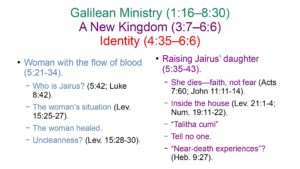The Ministry of Jesus in Galilee
Mark 1:16—8:30
A New King (1:16—3:6).
Kingdom is Near (1:15)
Popularity (1:16-45).
Conflict (2:1—3:6).
Jewish Leaders Reject Him (3:6)
A New Kingdom (3:7—6:6)
Kingdom Has Small Beginnings (4:3)
Continued Conflict (3:7-35).
Parables (4:1-34).
Identity (4:36—6:6).
Calming the Sea (4:35-41).
Healing a Demoniac (5:1-20).
Healing Woman with Issue of Blood (5:21-34).
Raising Jairus’ Daughter (5:35-43).

A messenger from Jairus’ house comes and says his daughter is dead and not to bother or annoy the Teacher, Jesus anymore.
Jesus is never bothered by the things we ask, even when it seems too late.
He contrasts fear again with faith—“don’t be afraid at this news, believe in Me.”
Here is the first of three instances where in Mark where He brings in the “inner circle” of the Twelve: Peter, James, and John.
This indicates a special event that He didn’t want too widely known right away.
Outside Jairus’ house there were people loudly mourning.
Back then, they had professional mourners who came and wailed loudly at times like this.
We are not told that’s what happened here, but I think it likely.
Jairus wasn’t there to hire them, but perhaps his wife did or another close relative.
When they ridiculed Jesus for His statements, it indicates a lack of emotional connection to the deceased—therefore professional mourners.
Jesus indicates that the child is sleeping. This is a common euphemism for death that we see in Scripture (Stephen – Acts 7:60; Lazarus – John 11:11-14). But it seems it was not a euphemism they were familiar with until Jesus.
He called the child’s parents and the three disciples into the room with Him and the girl.
Then He took the child by the hand—He touched a dead body, and therefore unclean again, along with all who are in the room (Lev. 21:1-4; Num. 19:11-22).
But again, He has power over that which is ritually unclean, enough to raise the dead.
He states the phrase in Aramaic, “Talitha cumi.” This tells us two things: 1) He spoke in Aramaic most if not all the time, and 2) here is another detail that gives evidence of an eye-witness account. Peter saw this and relayed this to Mark.
Mark translates it for his Roman audience so they will know what Jesus said.
The girl immediately arose—a true miracle that the people were amazed over.
Jesus had power over the wind and the waves, over thousands of demons at once, over diseases and uncleanness, and finally He even had power over death itself.
Even when we “revive” people today (restart a stopped heart, resume one’s breathing), it’s not like TV. It takes a long time for someone to recover enough from that to rise up, walk, and eat.
Yet she did these things, and Jesus even said she should be fed.
Only 5 people witnessed this miracle (6 if you count the girl), but it would be hard to keep this a secret, despite Jesus’ command—they all knew she was dead, but now she lives. What could have happened besides Jesus’ raising her?
What about “near death experiences” today?
A few years ago there was a big market for people hearing stories about heaven.
Many of them were later retracted which is no surprise since they are all hoaxes anyway.
We don’t hear a word from this girl or anyone else who was raised from the dead except for Jesus, let alone telling us what heaven was like.
Why? Some latch onto this and say it is evidence of “soul-sleeping.” But I think it’s simply because our bodies are here with their memory storage. If your soul leaves your body and is returned to it later, you will have no recollection of anything that occurred during this time since no new memories are forming in your brain. Simple as that.
- Sam and I had a good discussion after the recording ended about this. There is record of souls remembering what has happened in this life, particularly in Rev. 6 when the martyred souls cried out, “How long?” So if the above speculation is correct, then memory can transfer from body to soul, but not vice versa.
